How to Install Rooftop Solar in Georgia
A guide for Georgians interested in going solar.
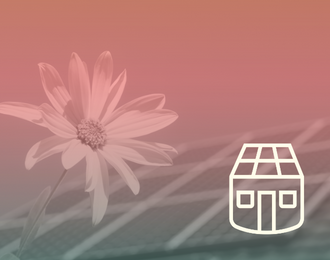
How Does Rooftop Solar Work in Georgia?
Learn how solar panels turn the sun’s energy into electricity for your home or business in our state.
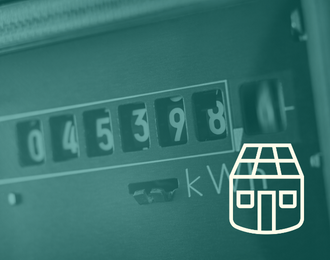
How Much Solar Power Can My Roof Produce?
Each rooftop is different. Find out how solar energy on your property can help meet your electricity needs.
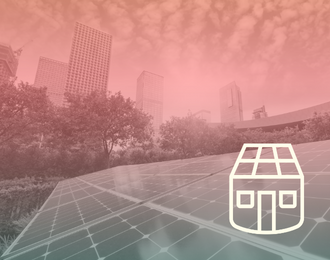
Is Solar Power Effective in Georgia?
Georgia has a powerful solar resource. Learn more about how solar is being utilized in our state.
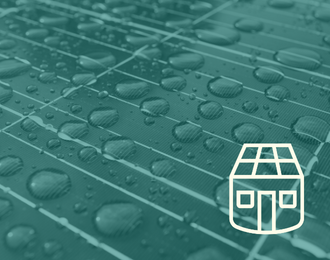
Do Solar Panels Produce Electricity on Rainy or Cloudy Days?
There are lots of myths about when solar panels can make power. Find out how the weather will impact your solar panels.
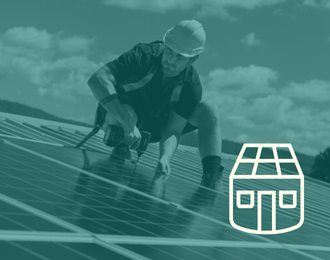
How are Solar Panels Installed?
Rooftop solar can work on many types of roofs. Find out what you need to know before installing solar.
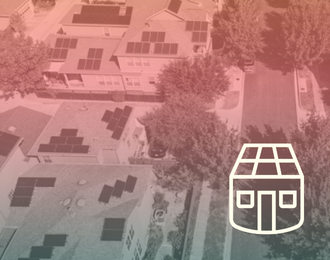
Which Type of Roof is Best for Solar Panels?
Solar panels can go on just about any roof. Learn how rooftop solar systems can work on different structures.
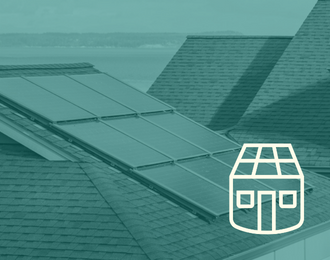
Can You Put Solar Panels on an East-Facing Roof?
Where should your installer place solar panels? The direction the roof faces is one thing to consider.
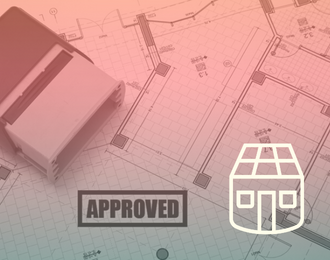
How Do You Apply for Solar Rooftop Permits in Georgia?
There is no standard permitting process in Georgia. Learn where to turn to get your permitting questions answered.
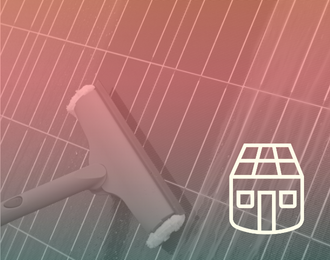
How Do You Clean Solar Panels on Your Roof?
Find what you need to know about keeping your solar panels clean and in good working order.
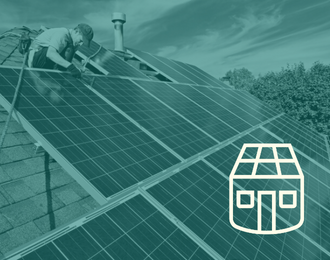
Could Installing Solar Panels Damage My Roof?
Solar panels should not damage your roof. Learn why finding a qualified installation company can keep your roof is good shape.
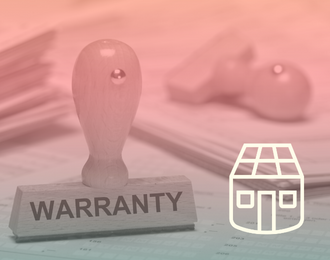
Does Installing Solar Panels Void a Roof Warranty?
Hiring a highly qualified solar installer can help you navigate important questions like this one.
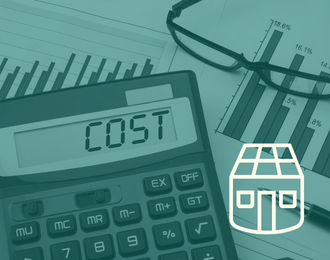
How Much Do Solar Panels Cost in Georgia?
Find out how much solar panels cost in Georgia and how to find the best price for your solar energy system.
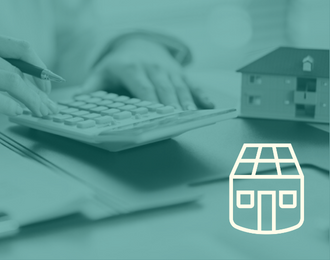
Are There Tax Credits I Can Use for Solar Panels in Georgia?
Learn about the availability of tax credits and other incentives to reduce the cost of installing rooftop solar.
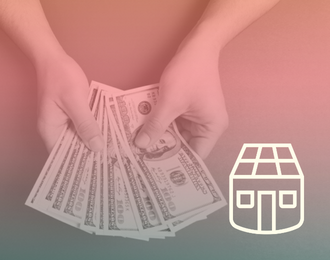
Can You Get Paid for Electricity That You Return to the Grid?
Find out more about how much you could earn for the electricity your solar panels send to the electric grid.
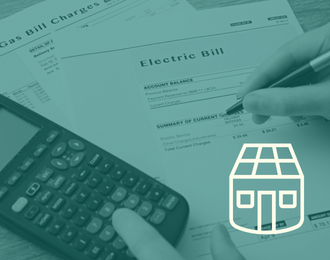
Will Rooftop Solar Lower My Electricity Bill?
How much your electricity bill decreases depends on a number of factors. Learn more about what will impact your bill.
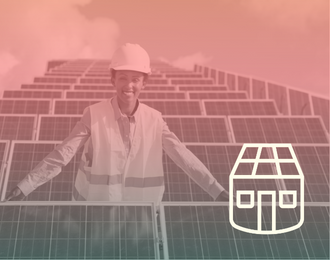
What Should I Look for in a Solar Power Installer?
Finding the right solar power installer is key - here's how to find a great companies working in Georgia.
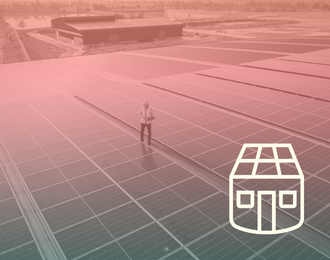
How is Commercial Rooftop Solar Different?
Commercial rooftop solar is very similar to residential rooftop solar, but these systems require the right installer.
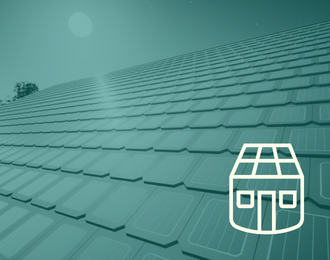
What Are Solar Panel Roof Shingles?
Learn more about what the next generation of rooftop solar may look like: the solar roof shingle.
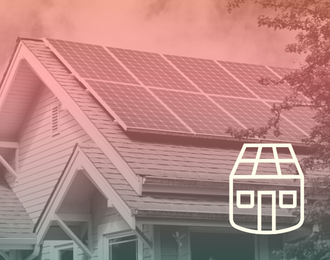
Do Solar Panels Have to Be on a Roof?
Rooftop solar is usually found on roofs. Find out other ways you set up these small-scale solar systems.

Learn More About Rooftop Solar in Georgia
Interested in learning more? There are many great resources about rooftop solar that you can explore.
How Does Rooftop Solar Work?
A rooftop solar energy system is made up of several important components to help provide clean solar electricity for our homes and businesses. These components are 1) solar modules, 2) inverters, 3) safety equipment like shut-off devices and module-level power electronics, 4) communications equipment to help you monitor your system, and 5) the racking structure that holds solar panels to the roof. Each piece plays a critical role in ensuring a safe and reliable source of clean energy from your solar energy system.
Solar panels produce electrons when hit by sunlight. Those electrons gather together and travel along tiny conductors inside the solar panel to create electrical power. The electricity leaving a solar panel is Direct Current (DC). Modern homes and buildings use Alternating Current (AC) to run our appliances, so electricity from solar panels must be converted before entering your home's electrical systems. Solar inverters convert the DC electricity from the solar modules to AC electricity for use in our homes and buildings. Inverters can either be located underneath your solar panels on the roof (called microinverters) or hung on a wall inside or outside your home.
All of the electricity converted by your inverter will enter your home through the interconnection point with your home's existing electrical infrastructure.This electricity will first and foremost go to meeting any electrical demand your home has in the moment that the electricity is generated. If your home needs more electricity than your solar panels are producing, then your home will draw power from both the solar energy system and your existing utility system. If your home is producing more solar power then your home needs, then the excess solar power can either be saved in a battery energy storage system or exported back to the utility grid. Your electric meter will keep track of the power you have consumed and the power you have exported. This is called bi-directional metering.
In Georgia, electric utilities are required in most situations to purchase or credit you for your excess solar energy exported back to the utility grid. Some utilities offer a program called net-metering, which credits exported solar energy at a rate equal to the amount they charge when you purchase electricity. This credit has the effect of offsetting the amount you pay for future energy consumption from the grid - like at night when the sun isn’t shining. However, if at the end of the month your home has generated more electricity than you have consumed, the monthly-net-excess energy is only credited at a wholesale rate called avoided cost. However, many of our state’s electric utilities don’t offer a net-metering program and only provide a wholesale credit for all electricity exported to the grid at any time. Every utility in Georgia is different, and it's important to work with a solar installer who knows your utility's energy policy. Be sure to get more than one quote for your solar energy system and ask your solar consultant questions about your utility’s policy.
Contrary to popular understanding, a rooftop solar energy system MUST shutdown and stop producing energy if the utility electricity-grid goes out. This national safety requirement protects utility workers from accidental solar energy export when working to restore electrical power to your home. Including a battery in your solar energy system will help you keep all or part of your home's electrical system up and running even in a utility grid outage! Excess solar power produced during the day will be stored in your home battery and will be available to use anytime your home needs more power than your solar energy system is producing - when the utility power is out, at night, or when the sun isn’t shining. Coupling a battery with your solar energy system allows your system to create a temporary isolated micro-grid for your home and builds resiliency into your home’s electricity system. When the utility electricity grid comes back online, your system will automatically reconnect and continue having available power from all sources.
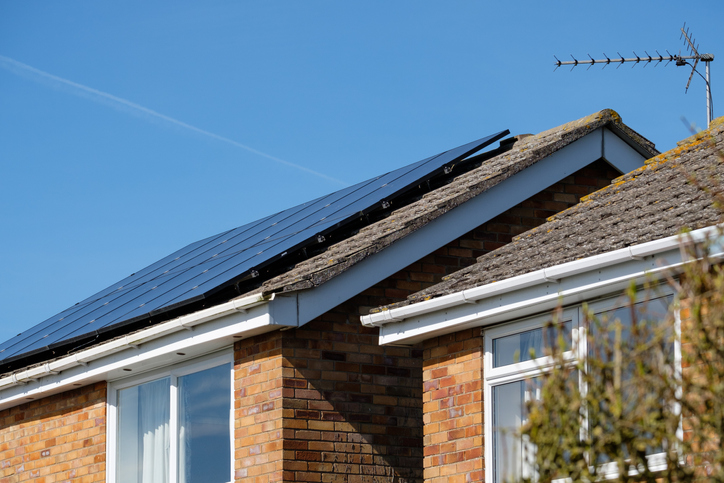
How Many Solar Panels Can I Fit On My Roof? How Much Solar Power Can My Roof Generate?
Every rooftop can fit a different number of solar panels and generate a different amount of solar electricity. Factors like roof size, orientation to the sun's path in the sky, roof pitch, nearby shading, and roof obstacles all play a role in both how many solar modules can fit on a roof and how efficient those solar modules will be at producing electricity.
Solar works on all types of rooftops! The most ideal roof is gabled with a single large unobstructed roof section facing 180 degrees due south at a pitch of between 6/12 and 9/12. On average, a solar energy system built on a rooftop with these conditions in Georgia will generate about ½ kWh per square foot of roof space per day based on today's technology. The average home in Georgia uses about 40 kWh of electricity per day. Which means that in ideal conditions you need just 800 sqft of rooftop space to provide all the electrical power your home needs.
The average home has enough roof space to generate between 50%-100% of its electricity needs - but that doesn’t mean it's a good idea to fill your roof with solar panels! Your utility’s solar metering policy, the impact of local shading on your roof, how and when you typically use electricity in your home, and your solar energy goals will all help determine the best available system size and design for your roof. A trained solar professional will be able to work with each homeowner and understand the impact of each of these considerations on the final system size and type.
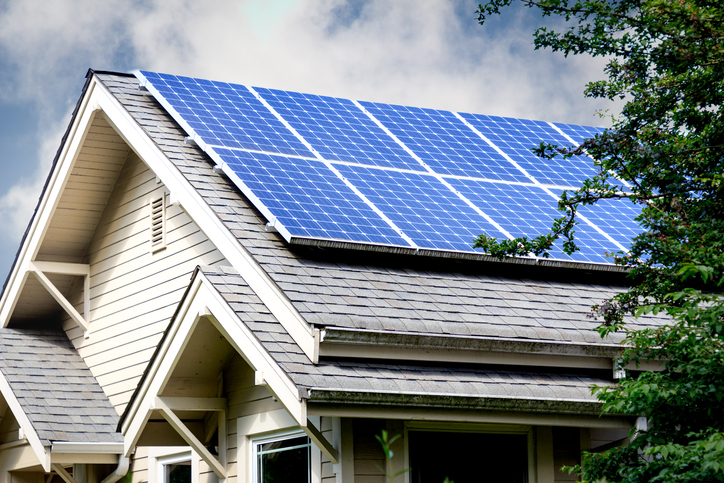
Is Solar Power Effective in Georgia?
Yes! The State of Georgia is already ranked 7th nationally for the total amount of solar energy capacity installed. Our state has ideal weather conditions for high-efficiency solar energy systems and is home to some of the largest solar panel and battery energy storage manufacturers in the United States. Next to the Sunshine State of Florida, Georgia received more sun-hours per year than any other state in the southeast.
Unfortunately, our state is ranked 43rd in rooftop solar installations due to a range of local, state, and utility policies that have made it challenging for homeowners, nonprofits, schools, and businesses to access the big benefits of rooftop solar energy. For instance, Georgia’s largest electric utility Georgia Power has a net metering program that capped participation to just 5,000 of its 2.5 million customers.
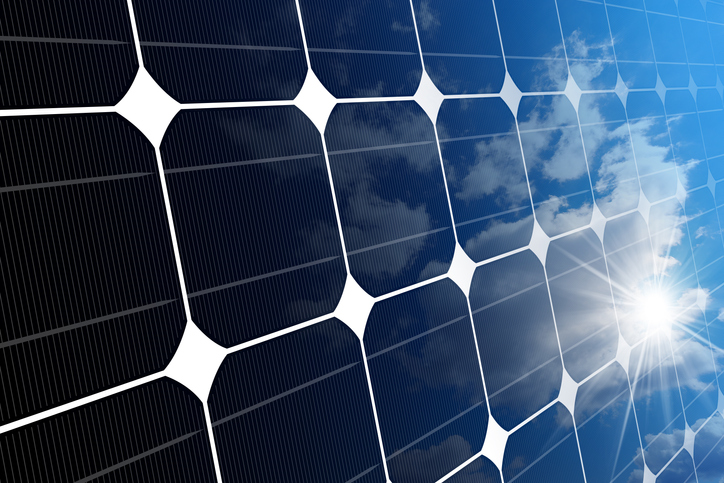
Do Solar Panels Produce Electricity on Rainy or Cloudy Days?
Solar panels only produce about 10%-20% of their rated power capacity in the rain. Photovoltaic solar panels can use direct or indirect sunlight to generate power, though they are most effective in direct sunlight. Solar panels will still work even when the light is reflected or partially blocked by clouds. Rain actually helps to keep your panels operating efficiently by washing away any dust or dirt. If you live in an area with a strong net metering policy, excess energy generated by your panels during sunny hours will offset energy that you use at night and other times when your system isn't operating at full capacity.
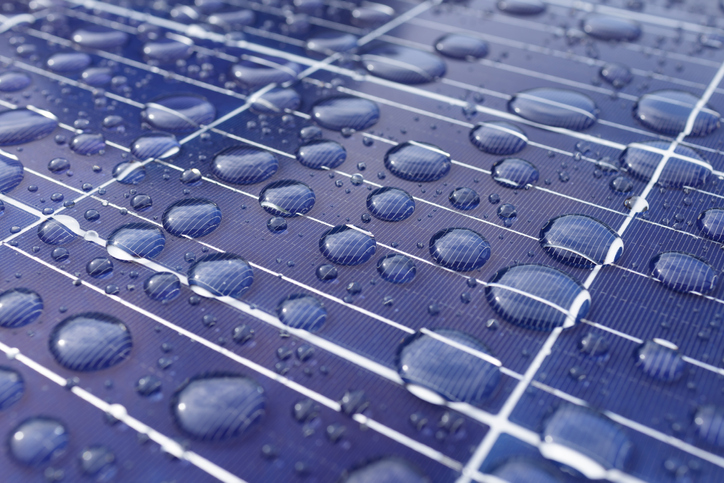
How are Solar Panels Installed?
How solar panels mount to your roof is an important part of your solar energy system. Solar panels are connected to your roof through a racking system. Racking systems vary depending on the type of roof you have on your home or business. There are five basic types of rooftop solar racking systems based on the type and style of your roof:
- Mechanically attached racking for asphalt shingle roofs
- Ballast-mounted racking for flat roofs
- Non-penetrative attachment racks for standing seam metal roofs
- Penetrative attached racking for profile metal roofs
- Integrated solar shingles
Solar rooftop racking systems are often rated to withstand winds in excess of 120 miles per hour , and in many cases can actually protect your existing roof. No matter the type of rooftop mounting system, solar racking manufacturers typically carry product warranties that match the full 25-year warranty on a quality solar panel and are likely to outlast the warranty on an existing roof. Additionally, a qualified solar installer will also typically offer a workmanship warranty of at least 1 year to protect homeowners.
Millions of homes in the United States have had solar energy systems installed on pitched asphalt shingle roofs using a lag-bolt and flashing system. This racking system allows your solar panels racking to be bolted to the rafters of the home’s roof. To ensure no possibility of leaks, the bolt-penetrations in your roof should be sealed and weatherized by your solar installation professional by both chemical (caulking) and mechanical (flashing) means. Your solar panels are then attached and bonded to the racking system per the manufacturer's instructions.
Flat rooftops using a rolled thermo-plastic or rolled asphalt adhesive covering are becoming more popular with modern buildings. Solar panels installed on flat roofs often need no mechanical attachment to the roof itself. Instead, solar panels are set and secured into manufactured trays that are weighted down to the roof using ballast-blocks made of stone or concrete. This technique introduces no holes in the roof and can make future system maintenance easier for your solar technicians.
Standing seam metal roofs are ideal for solar energy system installations. Like with an asphalt shingle roof, the solar racking system is mechanically attached to the metal roof. But, unlike a shingled roof, the system will clamp onto the metal seams of the roof material and not need to penetrate or introduce holes into your roof.
Profile metal roofs are long lasting. But, for a solar energy system to be attached to this roof type the solar racking system must screw into the metal of the roof itself in order to be mechanically attached. In some cases, the racking system does not need to penetrate the roof decking or roof structure in order to be firmly and adequately attached.
Integrated solar shingles may be the wave of the future for rooftop and residential solar energy systems. These shingle-type solar panels not only generate electricity but also act as your roof's primary barrier to the elements. Currently, solar shingles are very expensive and have limited availability.
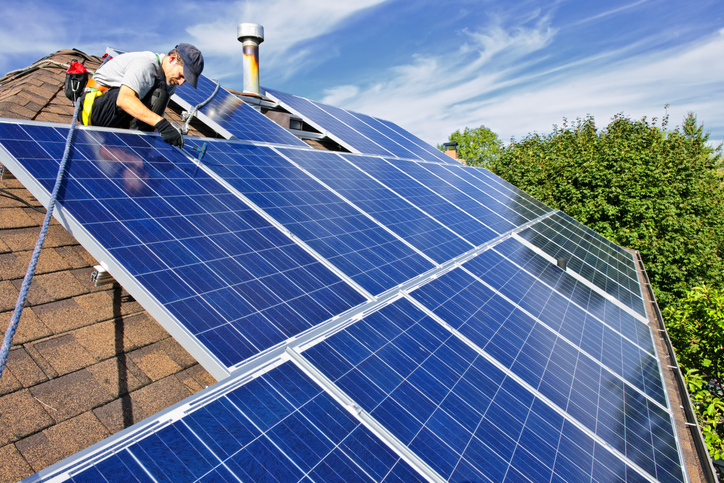
Which Type Of Roof Is Best For Solar Panels?
Solar panels can go on just about any roof- residential or commercial. Hardware manufacturers have developed numerous clamping and fastening devices to accommodate solar on just about any roof type imaginable.
Can You Put Solar Panels On A Metal Roof?
Yes. While there are several metal roof types, the most common in Georgia are standing seam and corrugated, both of which can accommodate solar panels. Standing seam roofs are particularly adaptable for solar due to a special device called an S-5 clamp. The S-5 is designed to clamp (think pinch) to the standing seam portion of the roof and therefore requires no actual penetration of the roof.
Can You Put Solar Panels on a Shake Roof?
The short answer is yes, you can put solar panels on a shake roof. However it does present some challenges. Shake roofs are more delicate than asphalt shingle or metal roofs and are sometimes made of wood, such as cedar. Installing solar on a shake roof requires a lot of attention to detail and extra labor so as to not damage the tiles underneath and around the solar array. It may be hard to find a company willing to install solar on a shake roof, and it will likely be more expensive. Homeowners with shake roofs may want to consider alternatives such as a ground mount, car canopy, or pergola application.
How Are Solar Panels Installed On a Tile Roof?
As with shake roofs, it can be done, but there are challenges. It will likely be more expensive than installing solar on a traditional asphalt shingle or metal roof. Additionally, due to the delicate nature of tile roofs, it may be hard to find an installer with the requisite skill and equipment. Homeowners with tile roofs may want to consider alternatives such as a ground mount, car canopy, or pergola application.
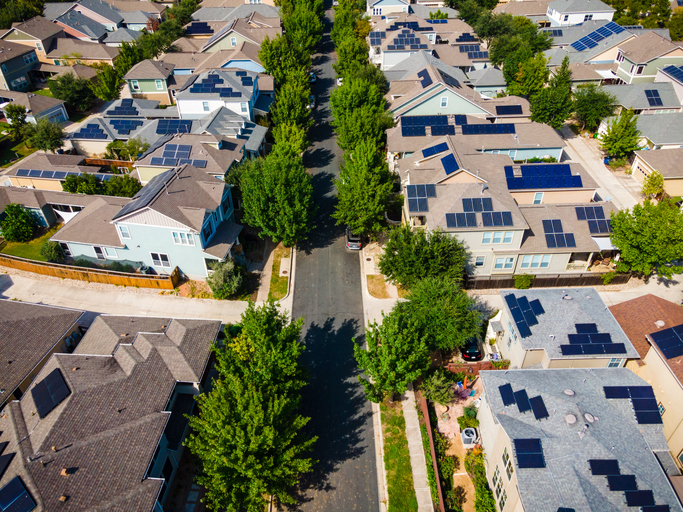
Can You Put Solar Panels on an East-Facing Roof?
Yes, solar can be installed on an east-facing roof, however, is not recommended as the first option. East-facing panels will generate more electricity in the morning, because the sun rises in the east, and less in the evening. East-facing solar can be beneficial if there is a high electricity demand in the morning hours. However, south-facing and west-facing are preferred orientations for solar.
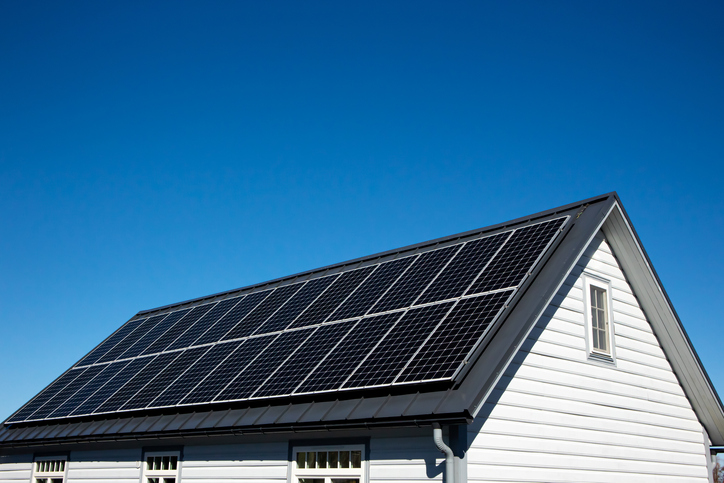
How Do You Apply for Solar Rooftop Permits in Georgia?
Because there is not a standard permitting process for all of Georgia, a permit to install solar must be obtained from the jurisdiction where the property is situated. Each jurisdiction will have its own requirements, so the best place to start is by calling your local permitting office to see what is required.
At a minimum, an electrical permit will be required, but additional permits or a structural engineering certification may be required in some jurisdictions. In addition, grid-tied systems, meaning the property is still connected to the utility grid (which 99% of rooftop solar installations are), a utility interconnection agreement will be required as well. A reputable installation company will include permitting and interconnection as part of the cost of installation.
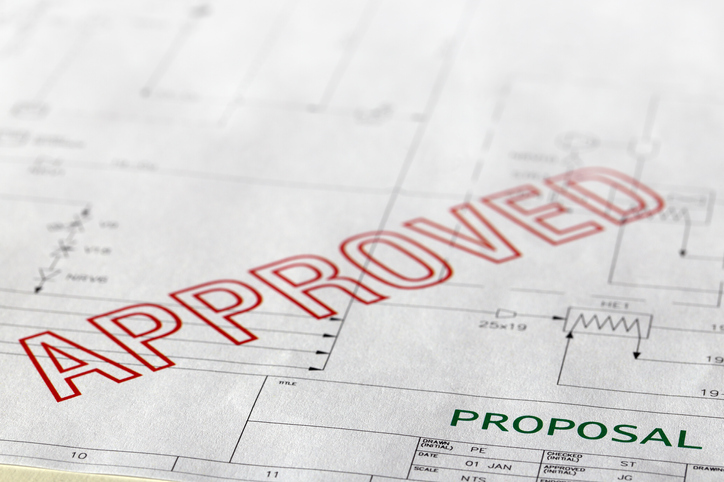
How Do You Clean Solar Panels on Your Roof?
Generally, it’s always good for solar panels to be free of dust, pollen, bird droppings and the like, but cleaning solar panels on a regular basis is not necessary. Even when solar panels become dusty or covered with a layer of yellow pollen, which is common in the spring in Georgia, solar panels will continue to generate close to their maximum efficiency. The next time it rains, the panels will be cleaned off and good as new.
Importantly, all solar energy systems come with generation monitoring so it’s easy to determine if there’s a drop in production and if a cleaning is necessary. Most solar installation companies offer an optional maintenance service where cleaning the panels is included. For do-it-yourselfers, a standard garden hose and soft cloth will do the trick. NEVER use a pressure washer as doing so could damage the panels.
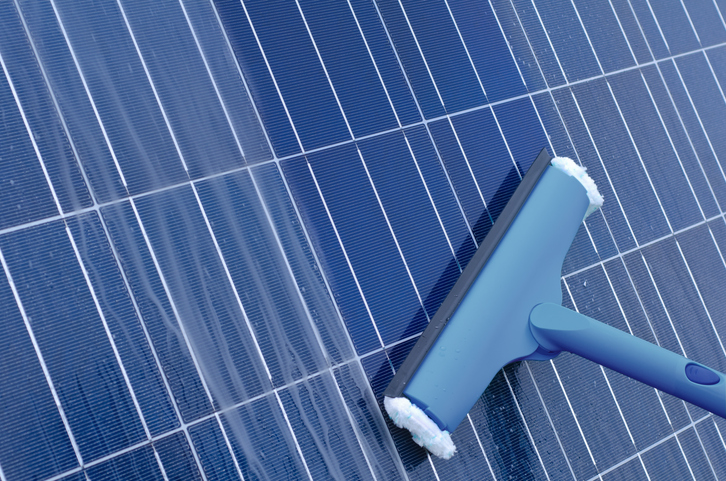
Can Solar Panels Damage a Roof?
Solar panels do not cause roof damage themselves. However, a poor installation can cause damage in some instances. Highly qualified installation companies will take great care in determining whether the roof can structurally support the additional weight load of the equipment to avoid roof sagging. Roof leaks from solar installations are rare. Special mounting brackets are used to connect the racking system to the rafters that include flashing and sealant to secure the connection and avoid the potential for a roof leak.
Customers should carefully consider an installation company’s workmanship warranty, which can vary in length and coverage, to determine how it covers damages to a roof caused by the solar installation.
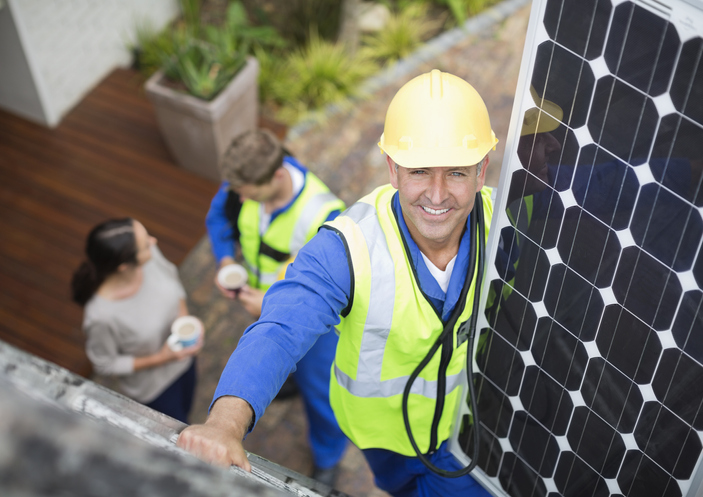
Does Installing Solar Panels Void a Roof Warranty?
It's important to hire a solar contractor that is highly qualified and can communicate with your roofing contractor, if possible, about what will void the roof warranty. If a workmanship warranty from your roofing company is still valid, they will want to know what type of racking system is being installed and how it is weatherproofed. While it is possible for the applicable part of your roof to be voided, solar panels should not void the warranty if they're installed properly with the correct forms of sealants or flashing.
Another important consideration when installing solar is the current condition of your roof. Solar panels are warranted for 25-30 years, and they are known to keep generating electricity after that. The general rule of thumb is this: if an asphalt shingle roof is over 10 years old, a roof replacement should be considered before installing solar panels.
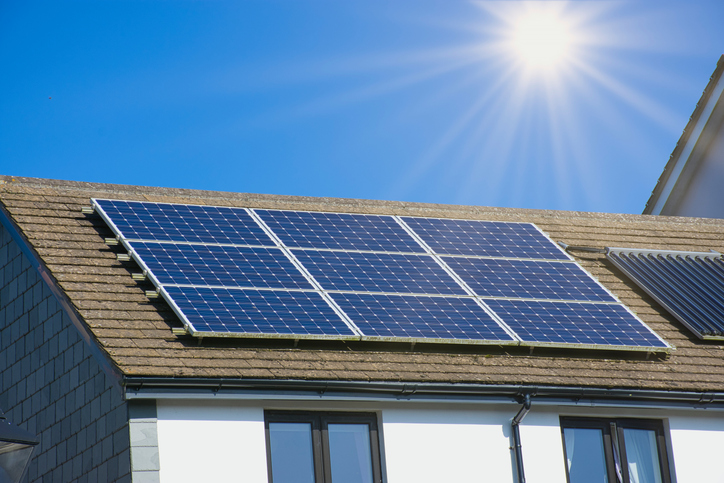
How Much Do Solar Panels Cost in Georgia?
Solar panel prices are often compared using a metric called the “price-per-watt,” which is the total cost of the system divided by the system wattage. For example, a 7kW system (7000 watts) priced at $23,000 is $3.30 per watt. The price-per-watt metric is great for comparing the price of systems that aren’t the same size in wattage, but keep in mind that larger systems will typically have a lower price per watt due to economies of scale.
Solar panels systems vary in cost based on several factors. There’s an economy of scale mentioned above (i.e. larger systems cost less than smaller systems). Some solar power systems may include a battery, which adds benefits but increases the cost significantly. Other factors such as roof pitch, roofing type, travel costs, non-contiguous layout, system warranty and more can affect the price.
The typical price range for residential solar in Georgia is between $3.00 – $4.00 per watt. The price for commercial solar varies greatly due to potential system sizes ranging from 50kW to 1MW or more.
Financing a solar energy system is often a viable option. Consumers can find solar-specific loans from banks like the "Clean Energy Credit Union" with 10-25 year loan options available. Interests rates available range from .99 -8.99%. Consumers should be aware that some loan-providers tack on extra fees to solar loans and solar companies often pass those onto consumers.
Commercial and non-profit consumers are also able to procure solar using a "Solar Energy Procurement Agreement" (SEPA). A SEPA allows a consumer to have solar panels installed for no out-of-pocket costs. The consumers agree to purchase all the electricity from the solar energy facility for a known, flat electricity rate for a period often spanning 20-30 years. This can be an excellent option to eliminate the high cost of large solar energy systems.
Always get multiple quotes and compare each contractor’s proposal.
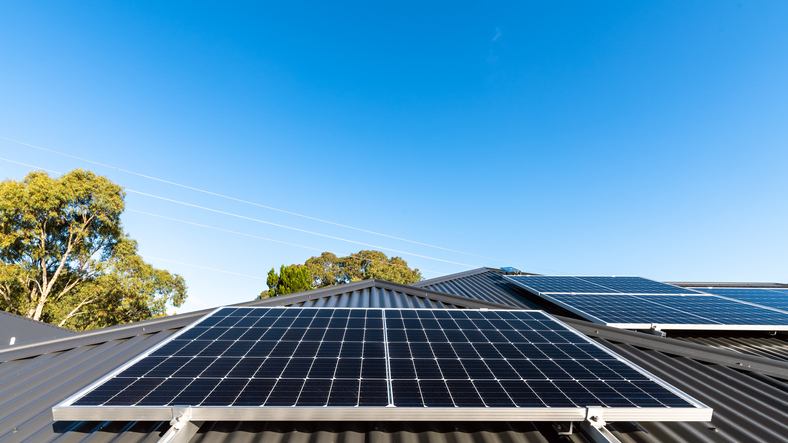
Are There Tax Credits or Other Incentives I Can Use in Georgia?
The Inflation Reduction Act, passed in 2022, included a 30% federal tax credit for rooftop solar for home and business owners. Although originally intended to run through 2032, this tax credit expired on December 31, 2025, following the passage of the One Big Beautiful Bill Act in July 2025. New solar systems must have been placed in service before the end of 2025 to qualify for the tax credit, so it is no longer available.
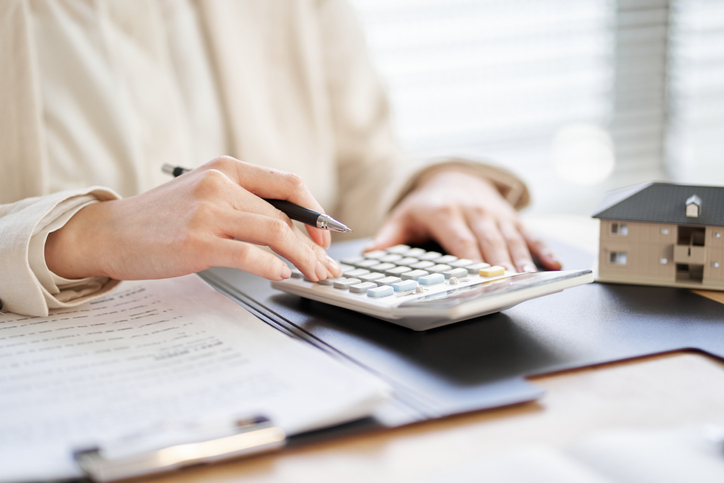
Can You Get Paid for Electricity That You Return to the Grid?
Yes, but the amount you get paid for each unit of electricity (called a kilowatt-hour or kWh) depends on your utility’s net metering policy. The most popular compensation policy in the country is called net metering. Net metering allows solar owners to offset their electric consumption dollar for dollar. Thirty-seven states plus most U.S. territories offer net metering.
However, most utilities in Georgia do not have net metering policies and, instead, will only pay solar owners the wholesale rate (aka “avoided cost”) for the energy that solar owners send to the grid. The wholesale rate is less than the price the utility will sell those electrons for, which is known as retail rate. To learn more, you can visit ratesofsolar.com to see your utility’s policy. You can also talk to a local solar power company and they should be able to tell you about your utility’s solar policies.
Will Rooftop Solar Lower My Electricity Bill?
Rooftop solar will generate an easily predictable amount of electricity, which is calculated using decades of weather pattern data and site specifics. But, how much your electricity bill decreases depends on a number of factors such as the size of the solar system, your utility rate plan, your utility’s net-metering policy, the orientation and tilt of your solar panels, the shade on the array, the times the building is occupied and using energy, and more. Bigger isn’t always better when designing solar systems, and your solar designer should be able to talk to you about your specific situation and what system makes the most sense for you.
Some battery storage systems can pair with solar systems to offer greater electric bill savings by doing what’s called peak shaving or TOU rate arbitrage.
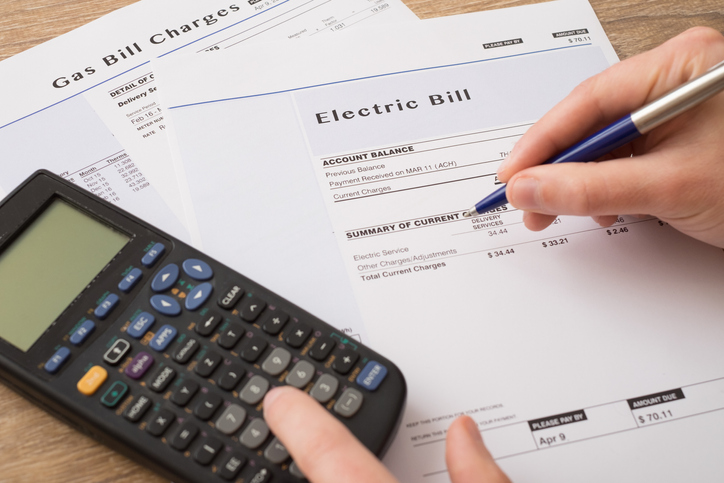
What Should I Look for in a Solar Power Installer?
Finding the right solar power installer is an important process. As with any industry, there are great companies working in Georgia as well as installers that should be avoided.
After you identify at least three companies you want to get quotes from, do your homework on each of them. As with any industry, there are people working in solar who just want to make a sale and will deceive customers to do so. Watch out for marketing gimmicks (e.g. “get paid to go solar”) and high-pressure sales tactics (e.g. “sign now or the deal is off the table”). Those tactics can be signs of trouble. You want to avoid companies that trick people into buying overpriced solar that won’t produce as much energy as promised.
In many cases, out-of-state companies operating in Georgia don’t fully understand how to properly and legitimately design solar in Georgia. It’s very different from other states. Among a myriad of things to know, they must understand how net-metering works at your utility. If they don’t, you can run into big problems when trying to get the Permission to Operate (PTO) from your power company. Typically the solar company you hire will handle the paperwork required to get the PTO for your solar, so be sure that’s in writing in their contract.
So how do you find a great installer? There are a few must-ask questions:
- How long has the company been in business?
- What city/state is their headquarters located? (You may want to ask for a copy of their business license as well)
- Can you see references for solar installations in your area?
- Can you see proof of licensure? You can verify it’s in good standing at the Georgia Secretary of State website.
- Are there staff members that are NABCEP PV Installation Professional certified?
- Can you see a certificate showing the company’s general liability and workers comp insurance?
You can also do your own research. With a simple web search of the company’s name, you can look for reviews, look for how many complaints they’ve had and if they have resolved the complaints. You cannot always trust third-party review sites. because those are pay-to-list websites that sometimes ignore serious issues. Instead, sites like Google Reviews and SolarReviews.com are good places to investigate a company’s reputation. In addition, Glassdoor is a website where employees can review companies they’ve worked for, so you can see what their employees say about them.
For further information on this topic, you can see Georgia Solar Energy Association’s buyers guides for homeowners and businesses.
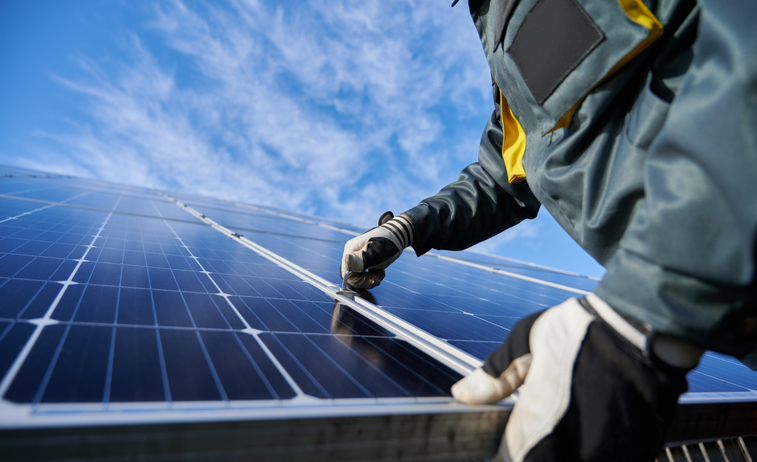
How is Commercial Rooftop Solar Different From Home Rooftop Solar?
Commercial rooftop solar is very similar to residential rooftop solar, but designing the system requires someone familiar with commercial utility rate plans and commercial buildings. Commercial rate plans are much more sophisticated, so accurately projecting savings is more of a challenge. You also want an installation crew that’s familiar with commercial spaces, as commercial buildings are constructed a lot different than a house. Solar on a business can be great for sales and marketing because many of today’s consumers prefer shopping at businesses who care about the environment.
Commercial and non-profit customers are able to procure solar using a "Solar Energy Procurement Agreement" (SEPA). A SEPA allows a user to have solar panels installed for no out-of-pocket costs. The users agree to purchase all the electricity from the solar energy facility for a known, flat electricity rate for a period often spanning 20-30 years. This can be an excellent option to eliminate the high cost of large solar energy systems.
What Are Solar Panel Roof Shingles?
Solar shingles or solar tiles replace the entire roof, eliminating the cost of building or replacing a traditional roof. Because the tiles are made of glass, they last much longer than a traditional roof. They also can have better aesthetics compared to traditional solar. The downside is cost and the upside is longevity and aesthetics. Solar shingle products have been attempted by many companies, but no product has become mainstream due to the high upfront cost of these types of systems. Although, they can pay for themselves just like a traditional PV system.
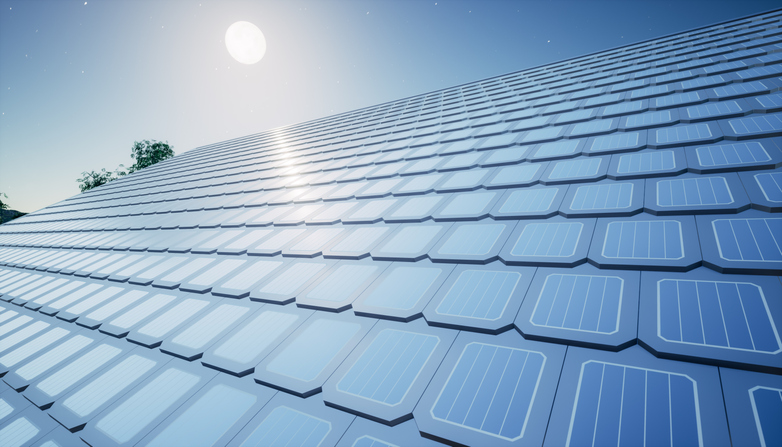
Does Rooftop Solar Have to Be on a Roof? What if I Want It Mounted on the Ground?
Rooftop solar is typically roof mounted, hence the name, but the term refers to any on-site solar connected on the customer side of the electric meter. The panels can be mounted in a variety of ways including roof, ground, parking canopy, pergola, awning, on a pole and more. The purpose of rooftop solar is to offset electricity that would otherwise come from your power utility.
Other Resources
Interested in learning more? There are many great resources about rooftop solar that you can explore.
Here are a few of our favorite resources about rooftop solar in Georgia:
- Solar Crowdsource is an organization that helps communities adopt rooftop solar together through its solarize campaigns.
- Interested in finding a solar installer in Georgia? One place to start your search is the database on Georgia Solar Energy Association’s website.
- CNET offers a helpful solar savings calculator and a guide to energy efficiency incentives, including rebates and other savings available in Georgia.


